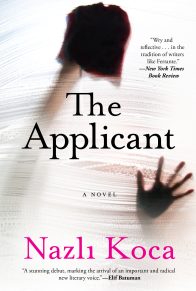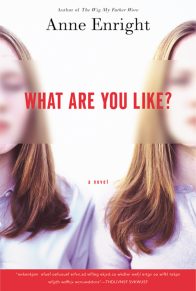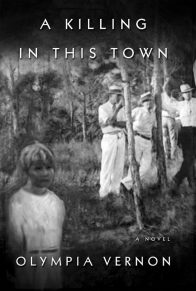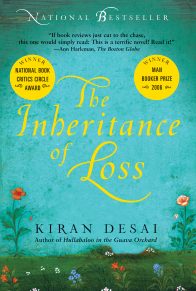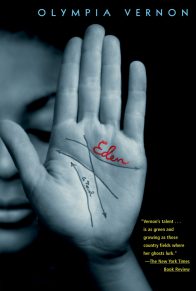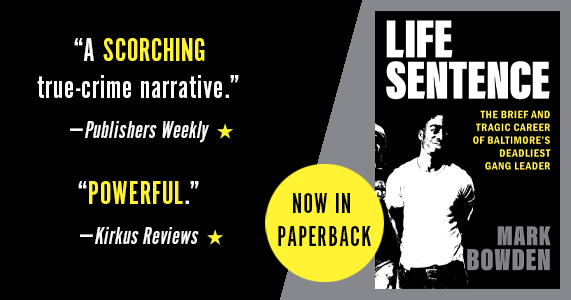She took the cast-iron skillet off the fire and turned away from the stove, the sound of birds trampling on a large oak tree, and faced her daughter, the child she had named Logic, because she had seen the word on one of the Missis’ magazines: a pale woman on the cover, her face upright and crooked, as if someone had dropped her entire body on concrete and cracked it at the jawbone.
Finally, she answered Logic’s question. “I s’pose you spell something like that by lookin” up,” she said. And then, as if confirming the space of thought in her head, she repeated, “Yeah, you spell heaven by lookin” up.”
Logic’s father, David, had loaded the pistol.
He laid the gun down on the table beside her. Now he was thinking of the manner in which he entered the world. He could almost remember sound, its first coming, instinctual, a finger going down his throat, forcing him to cry.
He felt the finger again, on his palate, as the voice of a man fell down upon his ears and made him cry even louder this time, the sound of a boy losing his strength.
He picked up the gun and looked out into the heat: the wooden boards of the house were rotting from the inside. He had built this triangular house with what was left of his hands; he was sort of a mathematician. He had set each board perfectly into the map of the house, except one that lay unevenly on the rooftop; he had found it on the side of the road. A metal loop had been hammered into it, a chain looped through the center. Steel.
“Where you headed?” The voice of his wife, Too, caused a gap in his breathing.
“Nowhere,” he said.
With this, he opened the door to the house he had built with his own hands–to prove to himself that he was not completely a wasted mold of clay. He whispered something, his hand up to his mouth for a moment, as if he had been working on something combustible and it exploded in his face.
* * *
Logic was in her bedroom lying on her back. She had long since touched her belly and discovered a cloud of butterflies floating around inside.
She could feel them again.
She began to laugh. She solved almost everything this way, with laughter. She felt a wing fluttering in her ovary. She touched her abdomen and began to follow the rhythm of blood flowing there. Or something else.
Her room was the coldest. Even in summer, a breeze rode the space of her intimate bedroom, as she opened her mouth and caught it.
She had not completely healed from the accident. Her mother came home from work one day and found her lying in the dust; she had fallen from the oak tree, her head filled with blood. Too thought she had been struck by a metal rod or an animal and washed the redness from her head; when Logic came to, she said she had fallen from the sky.
Too gave her an elixir and waited for her to fall asleep.
Something was there in the room. She heard it breathing and could almost see the thing she had heard pick up the square-shaped pillow with both hands, stand there above Logic’s head, and come down upon it. There was a terrible gasp. You must bear down, kill the girl before she gasps again. In a little while she will be dead, and Too Harris will be in a white woman’s window, watching the energy of a moving cloud. What had she done?
Then, as if impossible, Too Harris realized that she alone was in the room.
And she alone was holding the pillow.
She hurried, as if urgency would cause her to forget, and collected a sewing needle, returning to Logic’s bedside, where she had set the tools of surgery on an alabaster-white cloth: fishing twine, alcohol, fresh cotton, a leech.
Logic was fast asleep when Too picked up the parasite and watched as it sucked the poison out of her child’s head. She soaked the cotton with alcohol and pressed down on the cut. Next, the threading of the needle. The fishing twine entered the needle’s eye; she lifted the soft flesh of Logic’s scalp. The wound began to rise.
She had closed it up.
A few days later, she noticed that the child who had come from her stomach was no longer balanced in her footsteps. Part of her body seemed to have been metallicized. When she found her, she was in the shape of 45 degrees. Her words were not the same; they did not come from her body in the pattern of stars: every syllable surrounding her attitude, attached like a vein, a molecule.
But for her laughter, Logic had become invisible.
The butterflies had stopped their fluttering. Logic lifted herself from the bed. She looked around at the life-sized doll in the corner of the room. Of all the things around her–the lime-colored dinosaur with a horizontal bar of pink tape over its mouth; the musical clef note that she had traced from a tombstone; a paring knife, its sharp edge stained with blue ink, violated. But the doll–the doll she loved–the only thing given to her by her father after she had fallen from the sky.
She called it Celesta.
Her mother was in the next room. The house was built this way: three rooms on one side, the third being the operating room, where she had lain, after being sewn back together, on a long steel table her father had bought from a man in Pyke County. The man was convinced he had seen the feet of Jesus in the center of it and could not keep it because he was a sinner and did not want God in his house: he was plastic.
“Logic!” yelled Too. “You best be gettin” to bed now.”
The doll was in Logic’s hands. She looked at the face where she had painted her lips candy-apple red, the dark pupils she had slowly begun to gouge out because they were artificial, the almond-
colored skin. “I know.”
Soon after, she began to undress. She looked at herself in the mirror–her breasts were beginning to swell. Her body was emaciated; she felt she had a pyramid in her bones. The straight, invisible line that connected her nipples, the perfect navel in the center of her stomach, creating the image of a measurement that was equal on all sides–she had inherited the genes of her father the mathematician.
She parted the hairs on her head and touched the feeling. Yes, it was the parasite that had left its feeling upon her. She felt it tickling her at times: the blood racing, pounding upward. She could control the feeling when she wanted.
By swallowing.
There on the edge of her dresser lay the panties and gown that her mother had readied for her. She was thirteen now, but she had not learned the stability of time, how things were to be put in order. She lived in a place where time did not exist; she dreamed, on many occasions, of death and believed it came in threes. This is the memory that lived within her: three spirits into the Ultimate one, the number of days at a time that she’d stopped eating, the pointed invisible lines of the triangle, the alphabets of YOU–those which she added to herself, her vocabulary with a distinction that required no urgency, as it passed through her lungs–a slow rising of the tongue, as if a baby had slept there unmoved.
She knelt down, her hands folded, and began to talk to God.
Her mother lay on the other side of the wall, her flat body against the sheets. Her room was without light. She turned to ask God something and grew faceless, as if she did not exist at all in this unbehaved environment, as if it were God in the room with her in the early day, watching her hold the pillow: He saw she had suffocated the child, if only in her dreams.
For a spell, that season which comes and goes when a woman is restless, fascinated by her own accident, she wanted to crawl into bed with her daughter, ask her to pray for the thing that held the moment in its hands, so it would not come back again. Perhaps she knew that, were it to return, there would be a gasp that would split the belly of a quiet cloud and land high, up there where things go noticed, and come down, like oxygen, upon the earth and crush it.
Logic blew out the flame of a small lantern that stood beside her bed. The scent of the kerosene rose in the air, as she imagined herself opening up from the inside, where she believed there was a bed of larvae. Soon she would need an open door, a valve, to release them into the earth again. The image lay bound to the ink of the paring knife–its wings soon to be carved on the surface of her stomach.
When her father came home, his feet winding down, stopping near the operating room, she turned over and reminded herself to staple Celesta’s lips together by morning.
Copyright ” 2004 by Olympia Vernon. Reprinted with permission from Grove Atlantic, Inc. All rights reserved.





